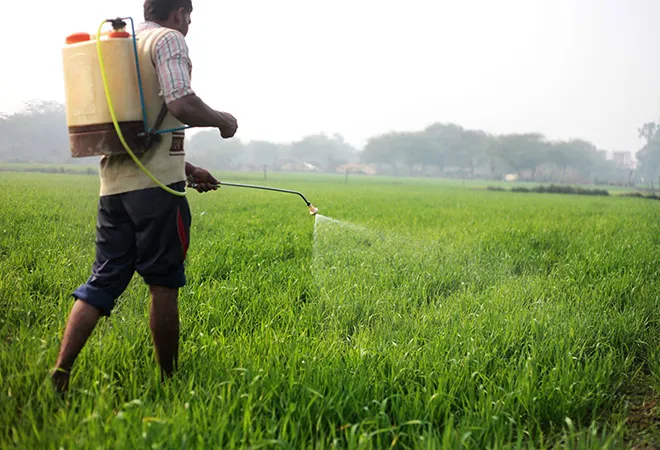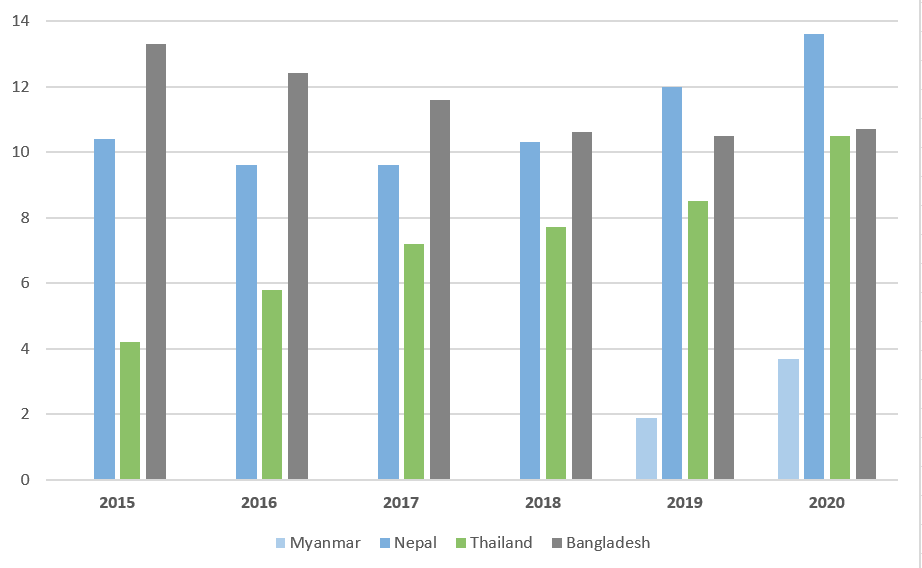-
CENTRES
Progammes & Centres
Location
India can advance solutions and drive international consensus on critical issues related to priority sectors such as food and energy in the Bay of Bengal region

As India presides over the G20 convenings across this year, India plays a crucial position in amplifying the priorities of the Bay of Bengal (BoB) region and the developing world on a global platform. For example, India's G20 presidency is economically crucial for the Bay of Bengal Initiative for Multi-sectoral Technical and Economic Cooperation (BIMSTEC) countries such as Bangladesh and Myanmar because of the existing Indian trade ties with the latter nations, access to India's Northeast, and their centrality to India's Neighbourhood First and Act East policies to forge better multilateral ties.
Additionally, as some of the most vulnerable countries in India's neighbourhood, such as Sri Lanka or Nepal, continue to absorb the economic fallouts of the pandemic or recent global disruptions such as the Russia-Ukraine conflict, Indian centrality can advance solutions, drawing from its own experiences, and drive international consensus on critical issues related to priority sectors such as food and energy.
Food security
In light of the Russia-Ukraine conflict and the subsequent food crisis, food security has emerged as a critical concern. Ukraine and Russia are essential players in global food supply chains, which has far-reaching implications for the vulnerable populations in low- and middle-income countries, including the economies of BIMSTEC. Moreover, these countries were already facing hunger-related challenges in the aftermath of the pandemic.
The global impact of the Russia-Ukraine conflict became evident as it disrupted the export of essential commodities. With Russia and Ukraine being significant exporters of wheat, barley, and sunflower oil, the halt in their exports had severe consequences for countries worldwide. Approximately 20 million tons of Ukrainian grain exports were disrupted due to the war, affecting countries across Africa, the Middle East, and Asia, which relied on an estimated monthly export of 6 million tons of agricultural commodities. However, as of June 2022, this export volume plummeted to only one-fifth of its initial value, exacerbating the global shortage and the conflict's impact on the agricultural sector.
With Russia and Ukraine being significant exporters of wheat, barley, and sunflower oil, the halt in their exports had severe consequences for countries worldwide.
Figure 1: Prevalence of Food Insecurity in Myanmar, Nepal, Thailand and Bangladesh (Population Percentage)
 Source: Authors' own, data from World Bank
Source: Authors' own, data from World Bank
Furthermore, the economic crisis in Sri Lanka had severe implications for the local population's food security, while Bangladesh grappled with the challenges of food inflation. In the case of Sri Lanka, the abrupt transition to organic farming in 2021 had a detrimental impact on the country's agricultural trade performance. The situation became so dire that it imported rice, sugar, and other commodities, including intermediate goods that were previously in surplus. By 2022, the tea industry, a significant commodity for the country, suffered losses amounting to US$425 million, exacerbating the foreign exchange predicament of the economy. Given these circumstances, it is crucial for regional alliances to establish safeguards against crises that may jeopardise their food security due to geopolitical events and domestic macroeconomic challenges.
Establishing a food bank specifically designed for the BIMSTEC countries, inspired by the ASEAN Food Bank, is a promising initiative that can contribute to price stabilisation. In addition, in November 2022, India hosted the second Ministerial-level meeting on agriculture for BIMSTEC nations to encourage member countries to collaborate on developing a regional strategy for agricultural transformation and the promotion of millets in food systems. Promoting the production and intra-regional trade of food items, such as millets, in countries with surplus production, can significantly reduce food insecurity within the region.
In the case of Sri Lanka, the abrupt transition to organic farming in 2021 had a detrimental impact on the country's agricultural trade performance.
Energy trade
When examining energy imports, it becomes apparent that all BIMSTEC countries, particularly India, Myanmar, and Bhutan, heavily depend on such imports. The reliance on the fuel trade poses a substantial challenge for the region, leaving it susceptible to external macroeconomic shocks. Furthermore, the Russia-Ukraine conflict highlights the criticality of nations achieving self-sufficiency in energy resources.
Table 2: Fuel Imports in BIMSTEC Economies (as a percentage of merchandise imports)
| Country | Most Recent Year | Import Percentage |
| Bangladesh | 2015 | 11 |
| Bhutan | 2012 | 18 |
| India | 2021 | 30 |
| Myanmar | 2021 | 20 |
| Nepal | 2021 | 15 |
| Sri Lanka | 2021 | 16 |
| Thailand | 2021 | 16 |
Source: Authors' own, data from World Bank
Bangladesh is facing a challenging situation regarding energy security due to its inability to transition towards renewable energy and its heavy reliance on fuel imports. In addition, the Russia-Ukraine conflict has further exacerbated these concerns. Escalating energy prices and mounting subsidy bills have resulted in fiscal imbalances and current account deficits, posing significant economic problems. As a result, the government was compelled to implement austerity measures. As a result, in August 2022, domestic prices of diesel, kerosene, octane, and petrol were increased by 42.5 percent, 42.5 percent, 51.6 percent, and 51.1 percent, respectively, reaching BDT 114, BDT 114, BDT 135, and BDT 130 respectively. This marked the highest price hike in nearly two decades, aligning the prices with neighbouring countries such as India, China, and Nepal.
Despite the previous development of the “Plan of Action for Energy Cooperation in BIMSTEC” in October 2005 and the signing of a Memorandum of Understanding (MoU) in August 2018 to establish the BIMSTEC Grid Interconnection, the BIMSTEC countries have faced challenges in advancing energy cooperation. These challenges include needing more necessary infrastructure, a flexible power market, and the absence of synchronised grid systems and grid codes suitable for electric power and natural gas pipeline technology. In addition, the lack of financial policies and related issues have also contributed to the slow progress in energy cooperation among the countries in the region. However, in 2021, the BIMSTEC Grid Interconnection Coordination Committee has set its sights on addressing these issues. It aims to develop a policy framework for trading and exchanging electricity, establish a tariff mechanism, and undertake the BIMSTEC Grid Interconnection Master Plan Study (BGIMPS).
India's National Green Hydrogen Mission can boost the manufacture, use, and export of green hydrogen in the country and accelerate the decarbonisation of the industrial and transportation activities of the regional value chains.
At the 27th Conference of Parties (COP27) in 2022, India renewed its 2070 net-zero commitment with a long-term strategy for phasing out all forms of fossil fuels, including coal and oil. In consonance with its vision, India can spearhead innovative advancements in renewable energy sources like solar and wind power in the Bay of Bengal region. In addition, India's National Green Hydrogen Mission can boost the manufacture, use, and export of green hydrogen in the country and accelerate the decarbonisation of the industrial and transportation activities of the regional value chains.
In conclusion, the G20 forum allows advanced and emerging economies to collaborate on global governance matters, fostering discussions on pertinent challenges. Within this context, India has a unique opportunity to emphasise the importance of attaining self-reliance by promoting regional value chains, particularly within the BIMSTEC region and the broader Global South community in the Indo-Pacific. By focusing on the food and energy sectors, India can showcase how developing robust regional partnerships can enhance economic growth, ensure food security, and bolster energy sustainability. Moreover, such efforts can pave the way for closer cooperation, technology sharing, and capacity-building amongst BIMSTEC nations, ultimately leading to a more prosperous and interconnected Indo-Pacific region.
Soumya Bhowmick is an Associate Fellow with the Centre for New Economic Diplomacy at the Observer Research Foundation
Debosmita Sarkar is a Junior Fellow with the Centre for New Economic Diplomacy at the Observer Research Foundation
The views expressed above belong to the author(s). ORF research and analyses now available on Telegram! Click here to access our curated content — blogs, longforms and interviews.

Debosmita Sarkar is an Associate Fellow with the SDGs and Inclusive Growth programme at the Centre for New Economic Diplomacy at Observer Research Foundation, India. Her ...
Read More +
Soumya Bhowmick is a Fellow and Lead, World Economies and Sustainability at the Centre for New Economic Diplomacy (CNED) at Observer Research Foundation (ORF). He ...
Read More +